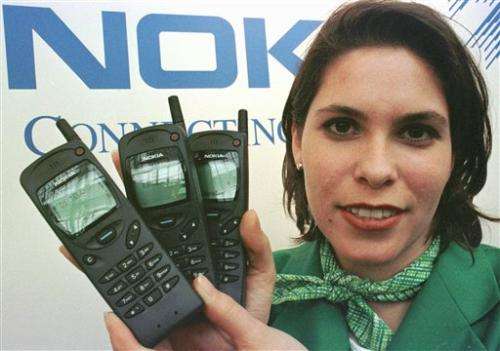Microsoft takeover of Nokia fans fears in Finland

Nokia, the former star of the cellphone world, has seen its light further dimmed by the news Tuesday that Microsoft Corp. was acquiring its handset operations.
"This is naturally a big day of change in Finland's industrial history," Finnish Prime Minister Jyrki Katainen told reporters in Helsinki Tuesday after Microsoft's 5.44 billion euros ($7.2 billion) deal was announced.
"Every now and then, there comes a time when one has to re-evaluate things to get ahead in corporate life and the society," he said. "I want to believe that this is the beginning of a new era (for Nokia)."
A source of national pride, Finland's Nokia Corp. had led the cellphone industry for more than a decade, reaching a peak of 40 percent market share in 2008. A long journey for the former paper maker and producer of rubber boots, which was founded in 1865 and was based in and named after a small town in the south of the country.
After 14 years as market leader, and providing a significant boost to the Finnish economy, Nokia failed to meet the smartphone challenge of Apple's iPhone and Google Inc.'s Android operating system and its dominance began to fade.
The company was also hit by a shift in electronics manufacturing from Europe and the U.S. to Asia and other low-cost regions. Asian competitors—particularly from China—were able to produce mobile technology at a fraction of the cost, and selling price.
Then, two years ago in an attempt to reverse the slide, it teamed up with Microsoft, replacing its old operating system with one based on Windows. The idea was to rejuvenate the company and claw back lost ground, but it took eight months—a long time in the frantic cellphone race—for them to produce the first Nokia Windows Phone, and consumers didn't warm to it.
Three years ago it employed 123,000 people globally, but that has now dropped to some 88,000 and its global handset market share has plummeted to 14 percent. Its share price has also dived, from 65 euros in 2000 to 3.97 euros Tuesday.
The irony is that, at one time, Nokia had been the smartphone pioneer, with a 50 percent market share in 2006. In 2003, it launched the Nokia 1100 phone—the best-selling mobile phone to date and a world top-selling consumer electronics product. Nokia had introduced a game console into a cellphone and later moved onto launch quality cameras into its handsets, in another popular move.
But its drive began to wane.
Nokia managers failed to recognize the popularity of clamshell models and were slow with touchscreen phones, even though its own engineers reportedly had developed a touchscreen model years before Apple and other competitors.
Jorma Ollila, who steered Nokia to its heights as CEO in 1992-2006 has said that the company was successful in that it was able to predict that the Internet would be "in everyone's pockets," but acknowledged that Nokia had failed to develop the necessary ecosystems and technology to maintain its lead over rivals.
Ollila was succeeded by his close colleague, Olli-Pekka Kallasvuo, under whose guidance the company's fortunes plummeted until he was fired in 2010 and replaced by the first non-Finn to head the company, Microsoft executive Stephen Elop.
After years of bad news for the acutely self-aware Finns, the latest Nokia development was taken mainly with disappointment but also a pinch of hope.
Microsoft CEO Steven Ballmer appeared to allay some Finnish concerns, announcing that the company would invest more than 250 million dollars in a data center in Finland to serve European customers.
"We are certainly deeply committed to Finland. Finland will be the center of our phone, device and research and development work," Ballmer said at a news conference at Nokia headquarters in Espoo on Tuesday. "We are beyond excited to have a strong and talented team join us in Finland with the expertise in hardware, supply chain management operations and more."
Neil Mawston from Strategy Analytics, near London, said that Nokia had placed "a huge bet" on Microsoft when it went into the deal with Microsoft in 2011.
Now, he says, Microsoft is jumping onto "a bandwagon that Apple and Google have been on" for some time. It could also mean an end to the Nokia name.
"The Microsoft brand and the Nokia brand are both equally famous, so I suspect there will be a tussle for which brand eventually wins out in hardware branding," he said. "I suspect if Microsoft owns the company and calls the shots then it may well be that the Microsoft brand wins in the long term rather than the Nokia brand."
© 2013 The Associated Press. All rights reserved.




















